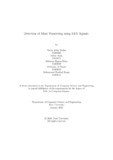| dc.contributor.advisor | Parvez, Mohammad Zavid | |
| dc.contributor.advisor | Rahman, Md Anisur | |
| dc.contributor.author | Tasika, Nadia Jebin | |
| dc.contributor.author | Alam, Salwa | |
| dc.contributor.author | Rimo, Mohsena Begum | |
| dc.contributor.author | Haque, Mohtasim Al | |
| dc.contributor.author | Haque, Mohammad Hasibul | |
| dc.date.accessioned | 2020-03-08T05:48:25Z | |
| dc.date.available | 2020-03-08T05:48:25Z | |
| dc.date.copyright | 2020 | |
| dc.date.issued | 2020-01 | |
| dc.identifier.other | ID 15301106 | |
| dc.identifier.other | ID 15101071 | |
| dc.identifier.other | ID 15301009 | |
| dc.identifier.other | ID 13301082 | |
| dc.identifier.other | ID 13301047 | |
| dc.identifier.uri | http://hdl.handle.net/10361/13835 | |
| dc.description | This thesis is submitted in partial fulfillment of the requirements for the degree of Bachelor of Science in Computer Science, 2020. | en_US |
| dc.description | Cataloged from PDF version of thesis. | |
| dc.description | Includes bibliographical references (pages 22-27). | |
| dc.description.abstract | Mind Wandering (MW) is the recurrent occurrence in which our mind gets disengaged
from the immediate task and focused on internal trains of thought. In terms
of intelligent interfaces MW can both have good as well as detrimental e ects; hence
it is crucial to measure MW. This interesting phenomenon and part of our daily life
can be e ectively measured using electroencephalogram (EEG) Signals. There are
several techniques that have been used to predict MW however; literature review
shows that there are still chances of further improvement in this eld. Therefore,
in this paper we proposed a framework based on data mining and machine learning
to detect MW using EEG signals. In our framework, we extracted a number of features
from 64 internal EEG channels. We evaluate the performance of our proposed
framework using 2 subjects with total of 19 sessions. The prediction accuracy of
the proposed framework is higher than the other researches under this field that
indicates the superiority of our proposed framework and efficiency of the data. | en_US |
| dc.description.statementofresponsibility | Nadia Jebin Tasika | |
| dc.description.statementofresponsibility | Salwa Alam | |
| dc.description.statementofresponsibility | Mohsena Begum Rimo | |
| dc.description.statementofresponsibility | Mohtasim AL Haque | |
| dc.format.extent | 27 pages | |
| dc.language.iso | en | en_US |
| dc.publisher | Brac University | en_US |
| dc.rights | Brac University theses are protected by copyright. They may be viewed from this source for any purpose, but reproduction or distribution in any format is prohibited without written permission. | |
| dc.subject | Electroencephalogram (EEG) | en_US |
| dc.subject | MindWandering (MW) | en_US |
| dc.subject | Support Vector Machine (SVM) | en_US |
| dc.subject.lcsh | Brain-computer interfaces | |
| dc.subject.lcsh | Electroencephalography | |
| dc.title | Detection of mind wandering using EEG signals | en_US |
| dc.type | Thesis | en_US |
| dc.contributor.department | Department of Computer Science and Engineering, Brac University | |
| dc.description.degree | B. Computer Science | |

